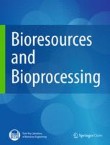Teredinibacter turnerae secretome highlights key enzymes for plant cell wall degradation
Carbohydrate-active enzymes (CAZymes) are crucial in the sustainable production of biofuels and raw materials from recalcitrant plant cell wall polysaccharides (PCWPs). Teredinibacter turnerae, a symbiont of wood-boring shipworms, is a prolific degrader of plant biomass, largely due to the extensive CAZyme repertoire in its genome. To identify key enzymes involved in PCWP utilization, this work analyzed the secretomes of T. turnerae E7MBN strain grown on sucrose, major PCWPs (namely cellulose, xylan, and pectin), and residual rice hull biomass using mass spectrometry-based proteomics. Experimental results show that T. turnerae E7MBN exhibited minimal enzyme secretion across various carbon sources, where secretomes mostly display similar functional profiles. A protein-protein interaction network analysis further revealed functional associations between CAZymes and several uncharacterized proteins, which include CBM-containing redox enzymes and a putative xylan-acting protein, thus offering new insights into their potential role in lignocellulose degradation.
